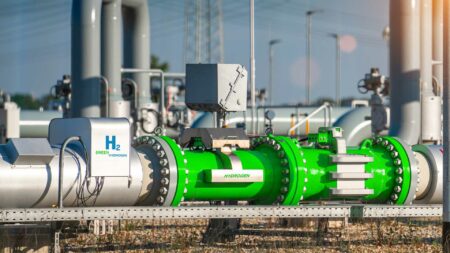According to a new report from Rethink Energy, the worldwide economic explosion of hydrogen will result in one of the largest shakedowns in energy history.
Hydrogen will offer a last-ditch effort to decarbonize 25% of total energy consumption. As carbon emissions become more taxed, hydrogen production capacity will rise, making it the most cost-effective means of supplying energy to sectors across the demand spectrum.
The company’s most recent report, Hydrogen to Clean Up Energy with $10 Trillion in Spending, provides a global forecast of hydrogen demand through 2050, with data provided for 21 key countries and 14 different economic sectors.
By the middle of the century, a $10 trillion investment will have reduced the cost of hydrogen by over 95% from 2020 levels, resulting in a 10-fold increase in global demand. On this timeline, 771 million tons of hydrogen will be required per year to get the world to net zero emissions.
The journey has already begun, with the report citing a massive increase in market activity in just the last year, with new gigawatt-scale projects and electrolyzer production facilities announced on a weekly basis.
Green hydrogen, produced by electrolyzers powered by renewable electricity, will undercut the price of existing (and polluting) grey hydrogen supplies in just two years. This will be the case globally by 2026, including in countries scrambling to make ends meet with the last of their stranded oil and gas assets. This timeline also ignores any unexpected breakthroughs in lowering the cost of green hydrogen, which we believe will result in costs falling much faster than predicted.
Industries will be transformed by a sudden shift in the value placed on environmental impact now that climate action and accountability are at the forefront of global politics. Late-to-act and heavy-emitting businesses will face a cliff-edge of failing investor support, in addition to having more expensive production methods.
As Rethink Energy’s ongoing coverage of the energy transition has revealed, no industry will be spared, from cement manufacturers to hedge funds.
Companies have used the ‘chicken-and-egg’ excuse to delay their investment in green hydrogen in recent years, citing blurred lines in their ability to decarbonize. The early movers, who already have projects well on their way to realizing the approach’s true benefits, will leave these laggards behind.
As green hydrogen replaces oil and gas, it will create a new landscape for geopolitics and clean commodities trading, in addition to the inherent cost advantages of a technology that will fall so rapidly in cost. It will destabilize industries based on corruption and provide a plethora of opportunities for developing countries to profit sustainably from their (often vast) natural resources.
This will begin with the current demand for hydrogen in the production of ammonia and oil refining (roughly 71 million tons per year), as green hydrogen gradually replaces fossil-fuel-based alternatives as it becomes more widely available.
Steelmaking and cement production, for example, which have plodded along for centuries using age-old techniques, will be forced to change as well. Pilot projects are already underway, demonstrating that hydrogen has the best chance of achieving net zero emissions by 2050, with commercial scale production beginning in 2024.
While electric vehicles will continue to dominate passenger transportation, the logistical advantages of storing, distributing, and refueling with hydrogen will see a growing share of green hydrogen used as the transportation market grows in size. By the time you get to heavy-duty trucks, hydrogen will be the preferred fuel for the vast majority of drivers, and hydrogen carriers – either e-fuels or ammonia – will be required in aviation and maritime markets starting in the late 2020s.
Renewable electricity will once again be the primary victor in terms of heating and power supply. However, due to the need for gas-based solutions to several logistical challenges in these markets, a significant portion of the market will require green hydrogen to decarbonize. By 2050, the sheer size of these industries’ energy demands will make them two of the most important users of hydrogen.
Utilities and energy suppliers’ roles will become increasingly intertwined with these industries, resulting in a plethora of opportunities across the hydrogen value chain as well as serious risks for those who fail to act or innovate now. The coming years will be critical in determining who wins and who loses in the transition for developers of fuel cells, electrolyzers, renewable technologies to power them, and distribution infrastructure to connect it all together. Many people have already lost their lives.








